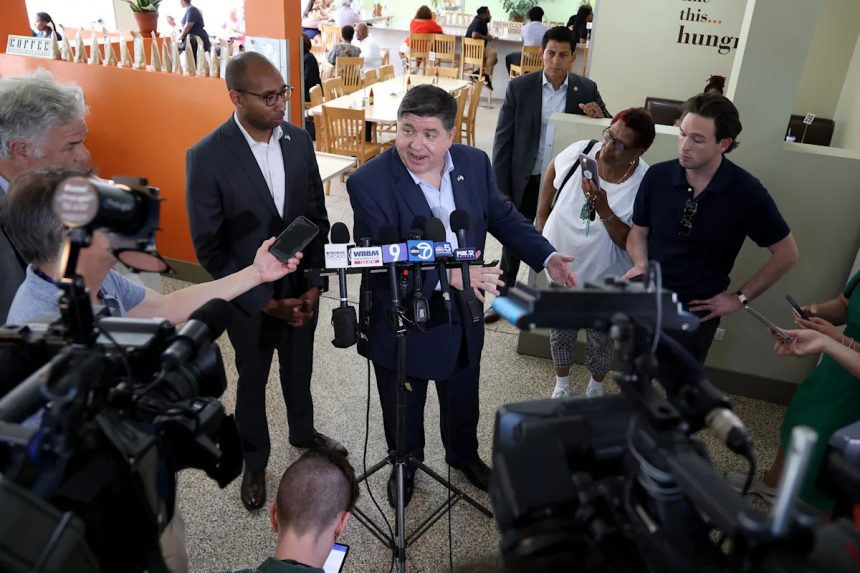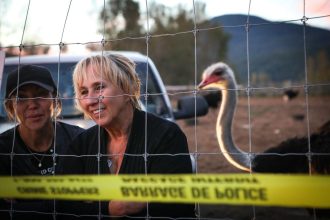SPRINGFIELD — Hundreds of contenders for public office began filing candidacy petitions with the Illinois State Board of Elections on Monday, vying to top March 17 primary ballots amid uncertainty over whether a prominent Republican governor contender will continue his candidacy following a family tragedy and a push by national Democratic leaders to redraw the state’s congressional boundaries to combat GOP-favored redistricting efforts in other states.
Staffers with the campaign of Republican governor candidate Darren Bailey filed nominating petitions on behalf of the Xenia farmer and his running mate, Aaron Del Mar, the Cook County GOP chair from Palatine, only days after Bailey’s son, daughter-in-law and two grandchildren died in a helicopter crash in rural Montana.
“If Darren decides that he wants to run, I will stand by him and we will run hard,” Del Mar told reporters outside the election board offices. “If he decides that he doesn’t want to run, then I will stand by him in that decision as well. Our campaign right now is no longer a political campaign. We’re the Bailey comfort campaign.
“There was some strong encouragement from President (Donald) Trump, who called on Saturday; he just showed so much grace in his conversation with Darren,” Del Mar said. “He understands the impact this has had to the Bailey family and to the state of Illinois in general. And he encouraged Darren to stay strong and to run. Darren’s taking that information, and it’s going to be part of our calculus of what we want to do.”
Bailey, a former downstate lawmaker, was the GOP’s 2022 nominee for governor, losing to Democratic incumbent Gov. JB Pritzker by nearly 13 percentage points. After an unsuccessful 2024 Republican primary challenge to veteran U.S. Rep. Mike Bost of Murphysboro, Bailey announced late last month another effort to try to unseat Pritzker.
On Wednesday, Bailey’s son Zachary, daughter-in-law Kelsey and grandchildren Vada Rose and Samuel were killed in the crash of the helicopter, which Zachary Bailey was piloting. Another of the couple’s children, Finn, was not on the aircraft, and Bailey and his wife, Cindy, have taken guardianship of him. The National Transportation Safety Board is investigating the crash.
Bailey, a Christian evangelical who made his faith a centerpiece of his last campaign for governor, has been going through emotional “peaks and valleys,” Del Mar said.
“You know, there’s times where Darren seems like his normal self, and then there’s times that he’s completely shattered,” Del Mar said. A funeral has been tentatively scheduled for Monday in Flora, Illinois, 100 miles east of St. Louis, Del Mar said.
Bailey’s chief Republican rivals for the governor nomination also filed nominating petitions on Monday, including Ted Dabrowski of Wilmette, former president of the conservative activist research organization Wirepoints Inc., and DuPage County Sheriff James Mendrick.
Pritzker also filed his petitions for a third term with new running mate Christian Mitchell. Mitchell is replacing Lt. Gov. Juliana Stratton on the ticket after Stratton announced she was pursuing a bid for the U.S. Senate seat being vacated by the retirement of veteran U.S. Sen. Dick Durbin.
The filing by candidates for state and federal offices came as U.S. House Democratic leader Hakeem Jeffries of New York met in Chicago with members of Illinois’ congressional delegation and the state legislative Black Caucus in trying to push Illinois to redraw its congressional map in an attempt to add one additional Democratic seat to counter Trump-backed redistricting in GOP-led states, including a move in neighboring Indiana.
Illinois’ current congressional map, drawn by the Democratic-controlled General Assembly and signed into law by Pritzker, was politically gerrymandered to favor Democrats in 14 of the state’s 17 U.S. House districts. But even many Democrats were surprised when the map actually gave them all 14 seats.
Jeffries is pushing to add another seat favoring Democrats, but he has encountered stiff resistance among some state Democratic lawmakers, including Black legislators who fear further changing the boundary lines would reduce Black representation. Others, meanwhile, are concerned that diluting existing Democratic districts could risk losing a seat to a Republican.
But after the Chicago meeting, Jeffries said, “Republicans are the ones who are breaking up Black and Latino districts all across the country.” He said Democrats “are committed to making sure that representation is preserved in districts currently held by African Americans and Latinos.”
Jeffries declined to offer specific details about any proposed map, though given the population difference and sharp political divide between northeastern Illinois and downstate, any change would likely be aimed at the current district of Darin LaHood of Peoria. The state’s two other GOP members of Congress, Mary Miller of Hindsboro and Mike Bost of Murphysboro, each have expansive downstate districts far from Chicago that would be more difficult for Democrats to turn into a winnable seat.
“The map is going to be for the legislature and the governor to decide and it’s our hope that those conversations will intensify this week in Springfield,” Jeffries said.
Both Democratic U.S. Rep. Robin Kelly of Lynwood and Lauren Underwood of Naperville said they were “on board” with Jeffries’ plan, and Kelly said it would affect each seat. Kelly has a Far South Side, south suburban and downstate district but is bypassing reelection to seek the U.S. Senate seat now held by the retiring Durbin. Democrats have expressed concern about pushing Underwood’s district into rural areas in northwest Illinois, which maintain solid GOP support.
State Sen. Willie Preston of Chicago, who heads the chamber’s Black Caucus and is running to replace Kelly in the U.S. House, said “there’s potential for us to support a map,” though he said he had not seen any proposed new boundaries. But he also warned, “If it diluted the Black vote in any” of the state’s three traditional Black congressional districts, “the answer is, ‘Hell no!’”
In Springfield, Black candidates for Kelly’s open seat, as well as for the seat vacated by U.S. Rep. Danny Davis, were mixed on the potential of new map lines and the prospect that new boundaries could force them to start over with new petitions.
“Can it be done right? That’s the question. I haven’t seen a map. No one’s seen a map. And that’s why it’s hard to say how can we be against something that we don’t know what we’re against,” said state Rep. LaShawn Ford, whom Davis has endorsed as a congressional successor. “Here we are in the blue state, we have the ability to do it, right, to protect the voters, protect the Black population and gain a seat. So that should be our goal.”
But state Sen. Robert Peters of Chicago, a Black candidate to replace Kelly in Congress, sought to avoid discussing the issue as he waited in line to file his petitions. Asked whether he favored Jeffries’ push, Peters wouldn’t answer, instead saying he was focused on current legislation in Springfield.
Jeffries also met later in the day in Springfield with Emanuel “Chris” Welch, the state’s first Black speaker of the House, and state Senate President Don Harmon. Jeffries declined to say if he had shown Harmon any prospective maps but said he did not show any to Welch.
After meeting with Harmon, Jeffries vowed of any remap effort: “Our commitment is to make sure that the ability of Black and Hispanic communities to continue to elect the candidates of their choice is not diluted in any way that will prevent that from happening now and into the future.”
Welch said in a statement that “all options must remain on the table to protect our democracy.”
Pritzker said a redrawing of the boundaries is “possible” and “something I think we’re all going to have to look at during the process here” as state lawmakers enter the second and final week of their scheduled fall veto session on Tuesday.
“That doesn’t have to happen during veto session. It could happen after that. But right now, I think there’s just a lot of conversation going on,” Pritzker said.
The effort to redraw congressional maps nationwide is being done with an eye toward the 2026 midterms. But such an effort for 2026 in Illinois could create a host of legal, logistical and political problems for Illinois Democrats.
Among the biggest potential issues are that candidates for Congress have already begun filing for office under the current boundaries, the time frame for the approaching March 17 primary is tight, and the lawsuits that follow every redistricting, including whether map lines meet provisions for ensuring racial and ethnic representation under the federal Voting Rights Act, are inevitable.
Candidates for the primary ballot began lining up outside the election board’s headquarters in a little-used strip mall on Saturday — largely out of tradition, since anyone in line by 8 a.m. is guaranteed a spot in a lottery to determine who will be listed first on the ballot for that office.
All statewide offices are at stake, including the comptroller’s office, where incumbent Democrat Susana Mendoza is not seeking reelection to potentially pursue a Chicago mayoral bid. In addition, all U.S. and state House seats and 39 of the 59 Illinois Senate seats will also be on the ballot. By the end of the first day of the weeklong filing process, 415 candidates had filed papers to run for a public office.
But filing petitions is only the first step in the candidacy process. Many contenders are likely to face challenges to the legitimacy of the signatures they gathered and ultimately won’t make it to the primary ballot.
On Sunday night, former police Officer Victoria Onorato sat in a chair bundled up in a blanket to file her petitions. She’s planning to challenge Illinois House GOP leader Tony McCombie of Savanna in the GOP primary. Onorato ran unsuccessfully for a House seat in 2022.
Now living in Byron in northern Illinois, Onorato said she arrived in Springfield, about 195 miles from her home, on Saturday morning to secure the first spot in line. She wouldn’t leave unless she had to take a bathroom break across the street at a grocery store that closes at 10 p.m.
“I know camping. You know, being a cop, I’m a survivor. You know, you do survival mode,” Onorato said. “No coffee. No tea. Just water. You know, things like that. You know, eat light.”
Durbin’s decision to retire from his U.S. Senate seat prompted candidacies by Stratton, Kelly and U.S. Rep. Raja Krishnamoorthi of Schaumburg and created congressional vacancies in Kelly’s 2nd District and Krishnamoorthi’s 8th District. The decisions by Davis and U.S. Rep. Jan Schakowsky of Evanston to retire at the end of their terms also prompted a huge number of candidates to seek office.
Evanston Mayor Daniel Biss was among 13 Democrats who filed Monday to run for Democrat Schakowsky’s seat, which represents Chicago’s Far North Side and north and northwest suburbs. A former state lawmaker, Biss was an unsuccessful 2018 primary challenger to Pritzker for governor before being elected to municipal office.
Standing in line outside the Board of Elections, Biss acknowledged the race for him was different from others he’s undertaken because of his feelings and strong opposition to federal immigration enforcement agents flooding the Chicago area, including Evanston, to carry out mass deportations pushed by Trump.
“I’ve never felt this way in a campaign before,” Biss said. “Masked armed agents of the state were driving around my town looking for brown-skinned landscapers to kidnap in Evanston. It’s so wrong. It is so immoral. It’s so un-American.”
“Ultimately, the solution has to come from Congress. And that’s why this race is so deeply motivating for me, and I think our whole community,” he said.
_____









